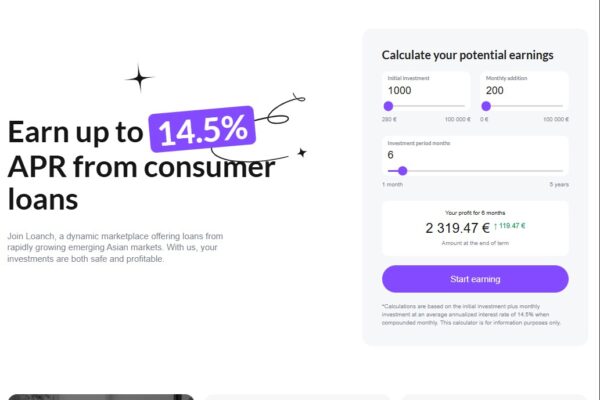Quitrade.org Scam Review -A Tragedy in Online Trading
You know that moment when everything seems to line up perfectly? The sleek website, the friendly “advisor,” the promise that this time — finally — you’ve found the trading platform that actually works? That’s how it felt when I first encountered Quitrade.org.
It looked legitimate. It sounded legitimate. And, for a brief, shining week, it even felt legitimate. Until it didn’t.
This is the story of how Quitrade.org — the so-called trading revolution — turned out to be just another cleverly disguised scam. And like so many others before it, it left a trail of confusion, silence, and financial loss in its wake.
The Beginning: The Perfect Pitch
It started the way these stories always do — with an ad.
Scrolling through social media one night, I came across a professional-looking post about “Quitrade – Your Gateway to Smarter Trading.” The ad claimed to use “AI-driven analytics” and “cutting-edge investment algorithms” that helped ordinary people achieve consistent daily profits. The visuals were stunning — graphs, testimonials, and phrases like “Trade like the pros with zero experience.”
Out of curiosity, I clicked.
The site — Quitrade.org — loaded instantly, displaying a modern interface filled with all the buzzwords that make newcomers feel like they’re in safe hands: “regulated,” “secure,” “fast withdrawals,” and “24/7 support.” It even had photos of “senior trading analysts” in crisp suits, smiling with confidence.
It was convincing enough to make anyone drop their guard.
Signing Up: The Smooth Setup
The registration process was simple: name, email, phone number. Within minutes, I received a friendly call from someone named “Mark.” His tone was calm, confident, and professional — not the pushy type I expected.
He said, “Welcome to Quitrade! You’ve just joined one of the fastest-growing trading platforms in Europe. Have you traded before?”
I told him I was new, and he replied with exactly what I wanted to hear: “Perfect. Our system does all the hard work for you.”
Then came the hook: “Most of our new traders start with $250 — it’s the minimum deposit to activate your account. Once that’s in, you’ll see the system in action immediately.”
I hesitated, but Mark reassured me with words that felt comforting at the time:
“Don’t worry. You can withdraw your money anytime. You’re always in control.”
The Illusion of Profit
After I deposited, everything happened fast. My dashboard showed an active trading account with live charts and real-time data. My balance seemed to grow every few hours.
$250 became $310. Then $375.
Mark called the next day, congratulating me: “See? Our algorithm works beautifully. If you increase your capital, your returns will scale even faster.”
It was tempting — who wouldn’t want to double an investment that was clearly growing? The interface showed all the right numbers, and the fake “profit tracker” made me feel like I was finally getting somewhere.
But here’s the catch: none of it was real.
Every gain I saw was nothing more than numbers in a simulation — programmed to rise just enough to keep me hooked.
The Manipulation Game
Over the following week, Mark kept calling — friendly, persistent, always professional. He offered “tips,” shared “market updates,” and even sent a fake report showing my “portfolio growth.”
His script was perfect. He’d say things like:
“You’re doing great. Most people wish they started like you.”
“If you add another $1,000, I can unlock premium strategies that yield higher margins.”
At first, it didn’t feel like pressure. It felt like encouragement. He positioned himself as a mentor — someone who genuinely wanted to help me succeed.
And that’s how Quirade.org’s scam works: they don’t sell trades — they sell trust.
The First Red Flag
I decided to test the platform’s promise of “fast withdrawals.” I requested to withdraw just $100 — nothing major, just a small test.
That’s when the tone changed.
Mark said, “Of course, we can process that, but first, we need to verify your account to comply with financial regulations.”
He asked for identity documents — driver’s license, proof of address, even a copy of my credit card (with some digits hidden). It felt invasive, but I complied, assuming it was standard security protocol.
Then days went by.
No withdrawal.
No confirmation.
No replies.
When I called the support line, I was placed on hold. When I emailed, I received automated messages. Mark, who used to call twice a day, suddenly disappeared.
The money, it turned out, was gone — trapped behind a wall of excuses.
Digging Deeper: The Truth Behind Quitrade.org
I started searching online. That’s when I realized I wasn’t alone. There were dozens of reports from people describing the exact same pattern:
-
Slick marketing and social media ads.
-
Small initial deposits followed by “account manager” calls.
-
Fake dashboards showing false profits.
-
Blocked or ignored withdrawal requests.
Even worse, the site’s company information was vague or nonexistent. No registered address, no license numbers, no mention of regulatory oversight. The “About Us” page read like a marketing script — big promises, zero facts.
A quick domain check revealed that Quitrade.org was a newly registered website, less than a year old. That’s a common feature of scam platforms: they launch, scam investors for a few months, then vanish and reappear under a new name.
A Familiar Pattern
Quitrade.org follows the same formula used by many modern trading scams:
-
Impressive presentation – A well-designed website to create trust.
-
Aggressive onboarding – “Account managers” that charm you into investing more.
-
Simulated success – Fake trading results that show constant profit growth.
-
Blocked withdrawals – Excuses and verification delays.
-
Silent exit – The website eventually goes offline, along with your money.
It’s efficient, repeatable, and devastatingly effective.
The Emotional Trap
What makes platforms like Quitrade.org dangerous isn’t just the financial loss — it’s the emotional manipulation.
They use psychology as a tool. The early profits make you feel smart, validated, and lucky. The constant communication builds a sense of partnership. By the time the trap closes, you’re not just financially invested — you’re emotionally attached to the idea of success.
That’s why so many victims struggle to accept what’s happened. They don’t just lose money; they lose confidence in their own judgment.
The Disappearing Act
Within months, the Quitrade.org domain started showing technical issues. Some users reported that their dashboards became inaccessible; others said the entire site redirected to a new URL that looked almost identical.
This is a classic tactic: once too many complaints surface, the operators rebrand. Sometimes they even contact previous victims under a new name, pretending to be a “recovery firm” offering to help retrieve lost funds — another scam stacked on top of the first.
It’s a ruthless cycle.
The Bigger Picture
Quitrade.org is part of a growing trend — fake trading platforms that operate under the guise of modern fintech innovation. They combine marketing sophistication with psychological manipulation, making them especially dangerous in an age where financial apps are normalized and trust in technology runs high.
What’s alarming is how coordinated these operations have become. Many share:
-
The same web design templates.
-
The same call scripts.
-
The same payment processors.
-
The same “instant profit” language.
It’s not one rogue website; it’s a network of coordinated scams, constantly mutating to evade exposure.
Red Flags You Should Always Watch For
If you ever come across a trading platform like Quitrade.org, watch for these universal signs of trouble:
-
Guaranteed returns or “no-risk” investment claims.
-
Anonymous ownership — no registered company, no licensing authority.
-
Untraceable payments, especially via cryptocurrency or third-party wallets.
-
Aggressive communication from so-called account managers.
-
Delays in withdrawal or new fees introduced out of nowhere.
-
Recently registered domains or lack of online presence before the last year.
Each of these, on its own, may not prove a scam — but together, they paint a clear picture of deception.
Final Reflection: What Quitrade.org Really Teaches Us
The hardest part about scams like Quitrade.org isn’t losing money — it’s realizing how easily trust can be engineered.
They know exactly what to say, how to say it, and when to disappear. They prey on hope, not greed. They understand that in an age of digital investing, appearances mean everything — and they weaponize that knowledge masterfully.
For every Quitrade.org that gets exposed, another two are already being built, waiting to launch under a different name.
The lesson isn’t just to be skeptical — it’s to verify everything.
Because when it comes to online trading, the most professional-looking platform in the world can still be nothing more than a trap with a logo.
Report Quitrade.org Scam and Recover Your Funds
If you have lost money to Quitrade.org, it’s important to take action immediately. Report the scam to Jayen-consulting.com, a trusted platform that assists victims in recovering their stolen funds. The sooner you act, the better your chances of reclaiming your money and holding these fraudsters accountable.
Scam brokers like Quitrade.org continue to target unsuspecting investors. Stay informed, avoid unregulated platforms, and report scams to protect yourself and others from financial fraud.
Stay smart. Stay safe






